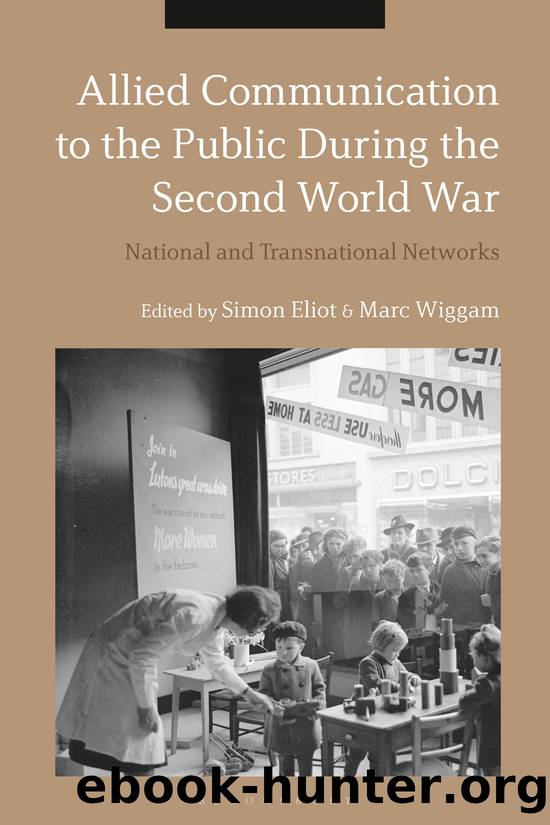Allied Communication to the Public During the Second World War by Simon Eliot;Marc Wiggam;

Author:Simon Eliot;Marc Wiggam;
Language: eng
Format: epub
ISBN: 9781350105140
Publisher: Bloomsbury UK
8
“For a German Audience We Do Not Use Appeals for Sympathy on Behalf of Jews as a Propaganda Line”: The BBC German Service and the Holocaust, 1938–1945
Stephanie Seul
The persecution and mass murder of six million Jews by the Nazi regime and its collaborators during the Second World War was a genocide of unparalleled magnitude and a crime against humanity. However, comparatively little attention was paid by governments and publics around the globe to the Jewish tragedy while it was unfolding, despite the fact that plenty of reliable information was emerging from Eastern Europe.1 In an attempt to understand the contemporary reactions to the Holocaust, scholars have studied the media’s responses, concluding that the press in the Western democracies as well as in Soviet Russia failed by and large to give adequate publicity to the Nazis’ treatment of the Jews. Why Didn’t the Press Shout? edited by Robert Moses Shapiro, scathingly criticizes international press responses to the Holocaust as too sparse, incomplete, misleading, and hidden in less visible parts of the newspapers. If the press had been more responsible, the book argues, and had informed the international public early enough and thoroughly enough, the history of the Holocaust might have been different.2 Likewise, Laurel Leff maintains that the New York Times failed to cover the Holocaust adequately. The “final solution” was hidden from readers in the inside pages of the paper and, due to the newspaper’s influence on other media, from the American public at large.3 Similar criticism was voiced of the British press4 , and Karel C. Berkhoff has pointed to the similarities in Soviet and Anglo-American media reporting, despite their ideological differences.5 The criticism also extended to broadcasting. The Voice of America—the US government’s overseas broadcasting station, funded by taxpayers’ money—kept virtually silent about the Holocaust.6 In contrast, the BBC—widely regarded as the most reliable source of information not only in Britain but also in Europe and around the globe—did report on the Jewish tragedy in its home and foreign-language services, but not as much as it could have, given the amount of open and secret information available at the time.7
For many Germans, in particular for critics of the Nazi regime, the BBC’s German-language broadcasts were an important alternative source of information in a country whose media had been subject to strict censorship and manipulation since 1933. Listening to foreign radio stations was illegal and penalties ranged from fines and confiscation of radio sets to imprisonment in a concentration camp, or even capital punishment, but the ban did not prevent Germans from listening in their millions.8 The question of how much was publicly known about the persecution and extermination of the Jews has therefore aroused considerable interest among historians.9 Several studies published in the early 2000s suggest that most Germans had a fairly good idea of what was happening to the Jews in the East due to information spread by the regime’s own propaganda, eyewitness accounts of German soldiers returning from the East, or reports from unofficial sources such as British and Soviet radio broadcasts.
Download
This site does not store any files on its server. We only index and link to content provided by other sites. Please contact the content providers to delete copyright contents if any and email us, we'll remove relevant links or contents immediately.
Cecilia; Or, Memoirs of an Heiress — Volume 1 by Fanny Burney(32004)
Cecilia; Or, Memoirs of an Heiress — Volume 3 by Fanny Burney(31426)
Cecilia; Or, Memoirs of an Heiress — Volume 2 by Fanny Burney(31371)
The Great Music City by Andrea Baker(30620)
We're Going to Need More Wine by Gabrielle Union(18586)
All the Missing Girls by Megan Miranda(14524)
Pimp by Iceberg Slim(13694)
Bombshells: Glamour Girls of a Lifetime by Sullivan Steve(13655)
Fifty Shades Freed by E L James(12873)
Talking to Strangers by Malcolm Gladwell(12797)
Norse Mythology by Gaiman Neil(12748)
For the Love of Europe by Rick Steves(11291)
Crazy Rich Asians by Kevin Kwan(8846)
Mindhunter: Inside the FBI's Elite Serial Crime Unit by John E. Douglas & Mark Olshaker(8648)
The Lost Art of Listening by Michael P. Nichols(7105)
Enlightenment Now: The Case for Reason, Science, Humanism, and Progress by Steven Pinker(6844)
The Four Agreements by Don Miguel Ruiz(6270)
Bad Blood by John Carreyrou(6245)
Weapons of Math Destruction by Cathy O'Neil(5779)
